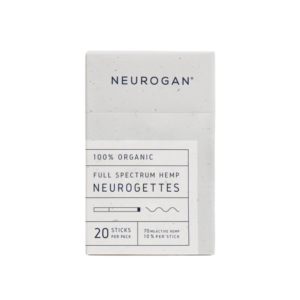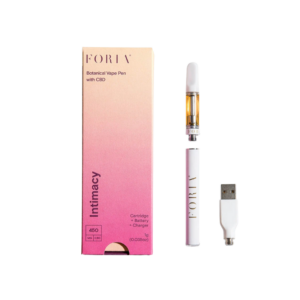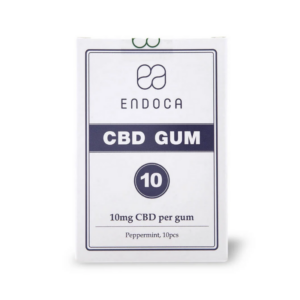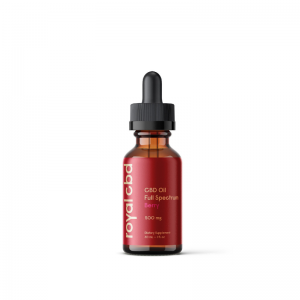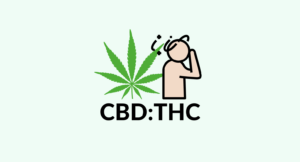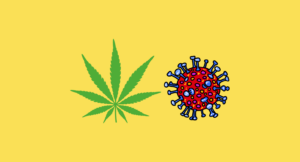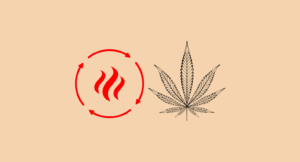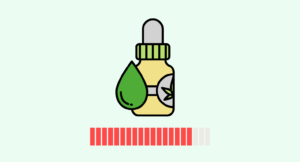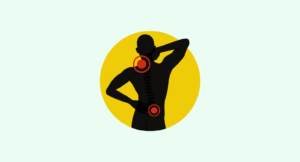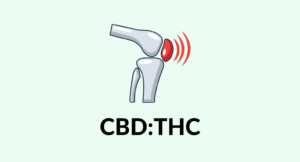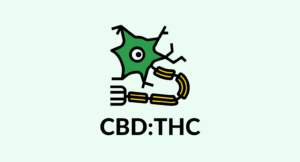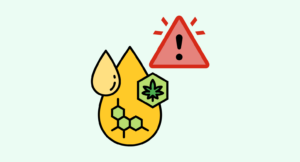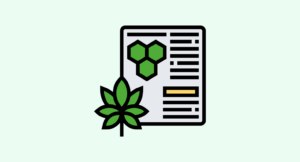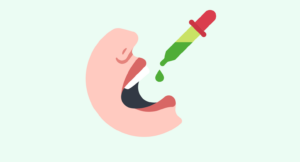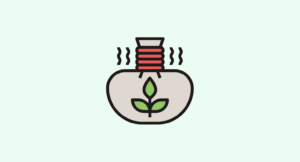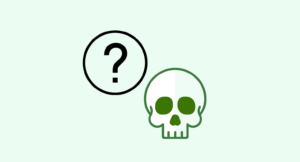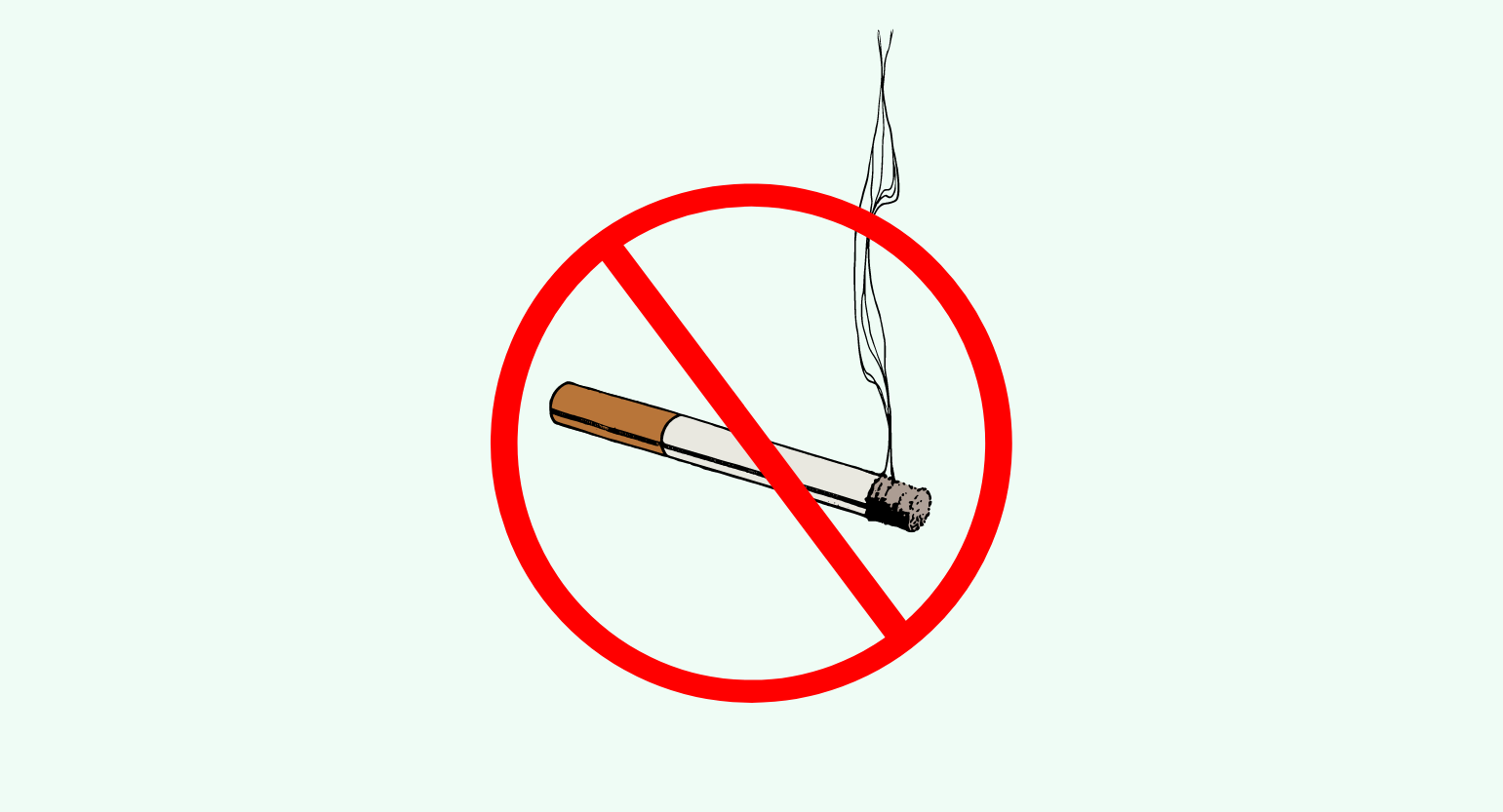
Evidence based
Can CBD Help Me Quit Smoking?
CBD may be a useful tool for people that want to quit tobacco.
But, how does it work, and is there any evidence to suggest its effectiveness against addiction?
Quitting smoking can seem like a daunting challenge, especially if you’ve smoked for several years.
If you want to stop using tobacco, it’s important to have a game plan and the resources available to reduce your chances of lighting up.
In this article, we’ll be looking at how CBD can help you quit smoking for good.
Can CBD Help Curb Addiction?
There’s a significant amount of evidence to suggest that CBD can curb addiction.
CBD (cannabidiol) works by binding to the receptors in the endocannabinoid system (ECS) [1]. The interaction CBD has with these receptors can influence certain reactions and encourage different responses within the body. It’s cannabidiol’s interaction with the endocannabinoid system that could make it a valuable resource to those suffering from addiction.
One study looked into the interaction CBD has with the endocannabinoid system in reaction to substance abuse disorder [2]. The study discovered that the endocannabinoid system plays an important role in the neurobiological processes associated with substance addiction.
The study concluded that CBD might help curb addiction for people using substances such as nicotine, alcohol, psychostimulants, and opioids.
The researchers found that the ECS is involved in the brain’s reward circuitry — a chemical reward response that can be triggered by substance abuse. It was discovered that CBD plays a role in triggering this reward response — potentially replacing the need for the addictive substances that also interact with this same response.
This research alone is extremely promising when looking at CBD and nicotine addiction. The conclusion of this study indicates that CBD could be an effective treatment for those suffering from substance addictions of many kinds.
Is CBD Itself Addictive?
Cannabis itself can be addictive and habit-forming. The level of dependency involved with cannabis ultimately comes down to the nature of the person using the substance.
CBD comes from cannabis, so it must be addictive, too, right?
Not exactly; cannabidiol doesn’t alter your brain function as the mildly addictive cannabinoid tetrahydrocannabinol (THC) does.
Therefore, you’re extremely unlikely to develop an addiction to CBD. This cannabinoid may also alleviate the psychoactive effects of THC, which could indicate its use in cannabis rehabilitation.
Although CBD isn’t addictive, and there’s little evidence to prove otherwise, as with anything, it can become habit-forming. This is especially true if you decide to use CBD to replace a smoking habit. Although CBD is far from nicotine addiction-wise, replacing tobacco with a CBD cigarette or vape could move your habit from one to the other.
CBD is definitely not as harmful as nicotine and tobacco, but the habit-forming transfer from cigarettes to CBD is definitely something to keep in mind if you decide to use CBD to quit smoking.
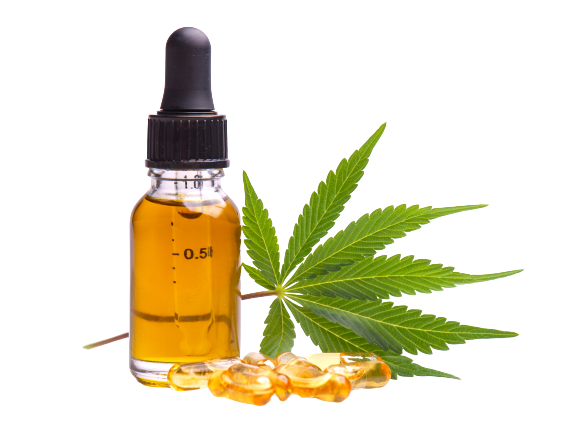
How Can CBD Help You Quit Smoking?
There’s plenty of evidence that suggests CBD is an effective way to help users quit smoking. CBD may help you get off tobacco in a number of ways. It could help replace the habit of physically smoking as well as aid in relaxation during times of stress (a common trigger for tobacco smokers).
In this section, we’ll be looking at four ways CBD may help you get off the cigarettes and on the path to a healthier lifestyle.
1. CBD Could Help Replace the Habit of Smoking
Most smokers will agree that the hardest part of getting out of nicotine addiction is cutting the habit. Whether you’re taking a break from work, finishing a meal, socializing at the bar, or commuting home from the workplace, a cigarette always seems to find its way into your hand.
The action of smoking is a habit in itself. It doesn’t matter whether you’ve been smoking for a lifetime or just a couple of years; going out for a cigarette becomes a normal part of everyday life. To put this into perspective, if you’re a pack-a-day smoker, you may spend around 120 minutes (two hours) per day with a cigarette in your hand.
The statement above may sound exaggerated, but there are 20 cigarettes in a pack, with each one taking around six minutes to burn. When you add that up, two hours is an under-exaggeration, if anything.
So, now you can understand why cutting that habit may be difficult. How do you replace the habit and find something else to take your attention off of cigarettes for that two hours per day?
CBD could be the answer to that question.
There’s a range of CBD products that may help you replace the habit of smoking. These products can be used in a similar way to a cigarette on your work breaks and during your free time. These products can also help you combat cigarette craving, as the action of inhalation is sometimes enough to keep the nicotine bug at bay.
There are a number of CBD products that can help you replace your smoking habit; here are some of the most effective options:
2. CBD May Aid Tobacco Withdrawal Symptoms
CBD may help ease nicotine withdrawal symptoms. One of the hardest aspects of quitting smoking is the withdrawal phase you go through once you finally stop. This phase can vary from person to person depending on how many cigarettes are consumed daily, how often nicotine is used, and how long the person has smoked.
If you’ve been using nicotine for any significant amount of time, you’ll likely experience some sort of withdrawal if you quit smoking cold turkey. This is because your body becomes dependent and used to the substance that’s consumed daily.
The first three to five days of quitting are reported to be the worst for withdrawal symptoms because this is how long it takes for nicotine to fully clear from the body. However, symptoms can last anywhere up to about two weeks. During this phase, you may experience physical, mental, and emotional symptoms.
These symptoms may include raised blood pressure, headaches, cravings, insomnia, spouts of depression, difficulties concentrating, and mood swings.
It’s during the first month of quitting that smokers are most likely to relapse. This is because your body is essentially telling you that you need the nicotine that you’ve been feeding yourself all this time.
Easing these withdrawal symptoms is key to successfully quitting smoking. CBD could help with this in a number of ways.
There are several studies that indicate CBD reduces withdrawal symptoms during recovery from a range of different substances, including tobacco. A 2018 study looking into the effects of CBD on 30 dependent cigarette smokers analyzed how the cannabinoid affected them during withdrawal [3].
The study discovered that when 800 mg of oral CBD was administered during a period of nicotine abstinence, cigarette cues, explicit pleasantness of cigarette images, and smoking cravings were reduced significantly. They also noted that systolic blood pressure decreased in the group using CBD during cigarette abstinence.
This is promising evidence that backs up the claims of CBD’s symptom-reducing qualities for people going through nicotine withdrawal. The evidence doesn’t end there, though. Another study from 2019 looked into the effects of cannabidiol on patients suffering from heroin withdrawal [4].
The study concluded that CBD significantly reduced anxiety levels, heart rate, and cravings for the drug. This is promising evidence for those that may want to use the cannabinoid to help them quit smoking. Heroin is considered far more addictive compared to nicotine, so we can assume that CBD will reduce nicotine cravings as well.
Related: Does CBD Interact With Nicotine?
3. CBD Can Help You Relax (A Common Trigger For Smoking)
CBD is commonly used by people that suffer from stress and anxiety. The cannabinoid may help the body and mind relax, as some studies suggest. This could be a favorable feature for those looking to quit smoking.
One case study looked into the effects of CBD on anxiety and sleep in 72 adults [5]. The study discovered that CBD significantly reduced anxiety levels in 57 patients and improved sleep scores in 48 patients. The test subjects also reported elevated calmness throughout the controlled study.
During the withdrawal phase, you may become restless and suffer from insomnia; CBD’s relaxing effects may help counter this effect. This is certainly a plus side, but the main area that CBD’s relaxing effects could help smokers looking to quit is by alleviating cigarette cues.
If you’re a smoker and have any kind of stress in your life, when a stressful trigger occurs, the first thing you probably reach for is a pack of cigarettes. Although nicotine is considered a stimulant, the action of smoking helps people relax and unwind in stressful situations.
CBD’s relaxing effects could help calm you down during times of stress and anxiety. The cannabinoid could be a way to replace that emotion-fueled cigarette you cling to during tough times.
4. CBD May Reduce Cigarette Consumption
As we’ve mentioned, CBD has the potential to replace a smoking habit, control withdrawal symptoms, and allow a release from stress. All of these factors may work together to reduce cigarette consumption and potentially cease consumption for good.
These factors aside, CBD may help reduce cigarette consumption in another way. Evidence that shows a correlation between CBD and cigarette consumption has come to light, and the news looks good for smokers looking to cut down or quit completely.
Studies have found that when CBD is consumed, it reduces the pleasure of smoking tobacco. Some research also suggests that smokers who’ve taken CBD are far less motivated to smoke cigarettes.
A 2013 study discovered some particularly interesting data [6]. The study found that tobacco-dependent individuals cut cigarette consumption down by using CBD. Cannabidiol inhalers and placebo inhalers were used in the study. Participants were asked to use inhalers when they got the urge to smoke.
The trial found that there was a significant difference in the number of cigarettes smoked between each group. The group that used the CBD inhalers showed a massive 40% reduction in cigarette consumption, while the placebo group showed no difference in cigarette consumption.
Suggested Reading: Comprehensive List of CBD Research.
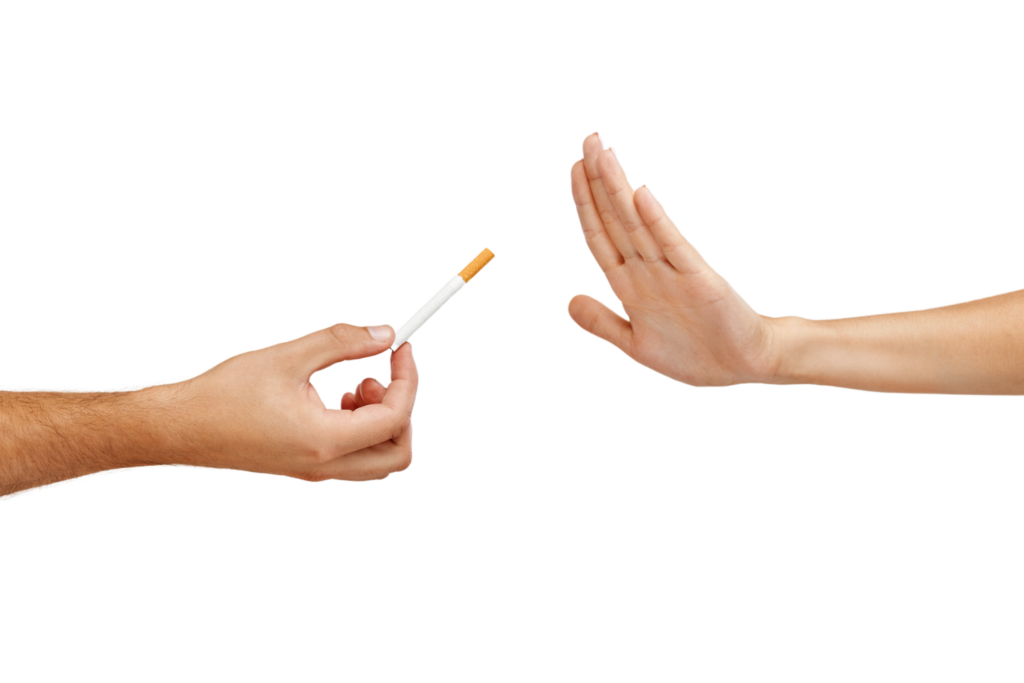
What’s The Difference Between CBD Cigarettes & CBD Pre-Rolls?
If you’ve been looking around at ways to use CBD to quit smoking, you may have come across the terms CBD cigarette and CBD pre-rolls. Both of these products sound the same, right?
Although they sound the same, CBD pre-rolls and CBD cigarettes do have their differences. Let’s take a quick look at what differentiates these two cannabidiol products so you can be in good stead when choosing what’s best for you.
A) CBD Cigarettes
CBD cigarettes are nicotine-free cigarettes that look almost identical to ordinary tobacco cigarettes. They usually come in packs of 20 and are contained in a package similar to normal cigarettes.
CBD cigarettes (or hemp cigarettes) contain finely ground hemp flowers. They have a filter and are the same length and shape as tobacco-filled smokes. Although they contain hemp (Cannabis sativa), they contain less than 0.3% THC; therefore, they’re federally legal across the US.
The subtle looks of CBD cigarettes are perfect for people that smoke regular cigarettes and are looking to quit. In other words, you won’t look out of place or as if you’re smoking a joint in the smoking area at work or outside the bar.
B) CBD Pre-Rolls
CBD pre-rolls are prepared joints that are made using hemp flowers. They’re professionally rolled, so they burn evenly and are ready to light straight out of the package.
CBD pre-rolls come in the traditional shape of a joint — cone-shaped and longer than your average tobacco roll-up or cigarette. CBD pre-rolls are great for people that are looking to quit tobacco, but they aren’t as inconspicuous as CBD cigarettes.
Lighting up a CBD pre-roll at work is going to get you some funny looks. These smokes look identical to joint. However, they don’t contain more than 0.3% THC so are federally legal.
How To Use CBD to Quit Smoking
Now we have analyzed the evidence and looked at some research that shows CBD’s potential in curbing addiction and aiding in quitting smoking; you’re probably wondering how to start using CBD to quit nicotine.
The truth is, there are several ways to use CBD to quit smoking. The way you choose will ultimately depend on you as a person. The route you go down will also depend on the results you want to see at the end of your journey.
If you’re happy with switching your smoking habit to something less harmful such as CBD cigarettes or CBD vaporizers, then the inhalation method will work for you. If you’re looking to curb the habit entirely, then this may not be as useful a method for you.
Before using CBD as an aid to quit smoking, you should first ask yourself what result you would like to see six to 12 months down the line. Once you’ve figured out whether you’re okay with replacing your habit with another or want to kick the habit completely, you can then choose which route to take.
With that in mind, check out the four points below to begin the end of your tobacco dependency with the best foot forward.
1. Source The Right Type of CBD
If you’re looking to use CBD to help you quit smoking, it’s important to source the best product for you. Not all methods of quitting work the same for everyone, and the product you choose is going to depend on personal preference and your goals.
There are several CBD products that can help you along the way when you decide to quit tobacco. The most effective are inhalable products, as these allow you to replace your smoking habit with CBD. However, if you want to cut that habit entirely, some other options are available.
A) CBD Cigarettes & Pre-rolls
CBD cigarettes are cigarettes filled with CBD hemp flower rather than tobacco. They contain no nicotine whatsoever and are a great herbal alternative if you’re looking to stop smoking tobacco. CBD pre-rolls are pre-rolled “joints” filled with hemp flowers. They’re similar to CBD cigarettes but are cone-shaped and provide a longer smoke.
Both of these formats contain less than 0.3% THC. CBD cigarettes a less conspicuous than pre-rolls and are perfect for work and social environments. Pre-rolls are a little more conspicuous and are best kept to enjoy at home as your coworkers and civilians may think you’re smoking a joint of marijuana.
B) CBD Hemp Flower
If you prefer to smoke rolling tobacco, CBD flower (hemp flower) may be a good option for you. The flower can be rolled up in cigarette paper and smoked in the same way as tobacco, so it may help replace the habit of rolling up and smoking.
CBD flower is what fills CBD pre-rolls and cigarettes, so as such, it contains less than 0.3% THC making it federally legal.
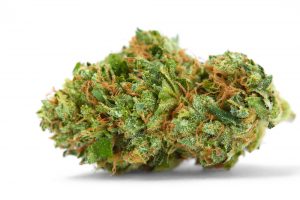
C) CBD Vaporizers
CBD vaporizer pens are perfect for people looking to quit smoking completely and who don’t want to inhale an alternative smoke after quitting tobacco.
CBD vaporizers contain CBD extract with a mix of propylene glycol and vegetable glycerin that when heated, creates a thick vapor that can be inhaled. CBD vapes come in refillable and disposable formats and don’t contain nicotine. They’re a great alternative to combustible products and are generally considered less harmful to your health.
D) CBD Inhalers
CBD inhalers are similar to those prescribed to asthma suffers. These inhalers contain water-soluble CBD that sprays directly into the lungs using an aerosol. They can be a good tool to use if you’re looking to quit smoking and cut the physical habit.
Although you inhale the CBD with an inhaler, it’s completely different to smoking or vaping. You won’t get the same satisfaction of smoking, but it may be enough to ease the cravings when they occur.
CBD inhalers are also a good way to replace nicotine inhalers if you’ve quit smoking recently using one. They can replace the nicotine inhaler and allow you to curb the addiction to the substance entirely.
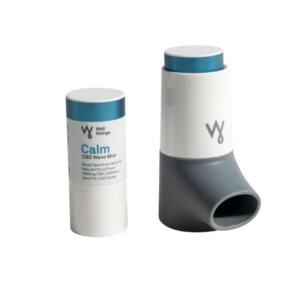
E) CBD Chewing Gum
CBD chewing gum is a great alternative to nicotine chewing gum. If you want to quit smoking and kick the inhalation habit entirely, then this could be the right route to take.
They’re also a great option for those that have stopped smoking by using nicotine chewing gum but now have an addiction to the gum itself. CBD chewing gum can be used to replace this and get over the nicotine addiction.
F) CBD Oils & Tinctures
CBD oils and tinctures are other options for those that are willing to stop smoking and are strong-willed enough to kick the habit entirely. As mentioned previously, there have been studies involving smokers and orally administered CBD.
These studies have shown excellent results, with cigarette smokers reducing consumption, feeling less motivated to smoke, and not getting as much pleasure out of smoking.
2. Make Sure to Find a High-Quality Product
Once you’ve figured out what CBD products you want to try throughout your quitting journey, you’ll need to find somewhere to source the products. Unfortunately, there are a lot of dodgy companies selling CBD products that aren’t as they’re described.
It’s important to avoid companies that cut corners because the products they offer could contain inferior CBD and/or other harmful additives. It’s likely that you want to stop smoking to improve your health, so finding a reputable company is of paramount importance.
So, how do you ensure a company is reputable and sells high-quality CBD?
The first point of call is to research the company thoroughly and find honest reviews and feedback from customers. An untrustworthy company that’s clearly scamming people will have some annoyed customers, so dig around if you suspect the business.
If you’re happy with the reviews and background of the company, go on to observe the third-party lab results for the product you desire. Any trustworthy company should have third-party lab results available with the percentages of CBD, additional cannabinoids, and other compounds that may be contained within the product.
If a company doesn’t have these available to view on their website, give them an email, and they should send them over to you. Any company that refuses to provide third-party lab results shouldn’t be trusted as they likely have something to hide.
Related: Top 30 CBD Vendors To Consider For 2022
3. Gradually Adjust Your CBD Intake
The amount of CBD you consume is another factor that will make or break your addiction to tobacco. It’s important to get your consumption correct to ensure you have the best chance of quitting.
There’s no specific dosage guide for CBD when using it to aid in addiction. However, you should start with a small amount and gradually work up your intake until you see noticeable effects. It’s also important to note that CBD doesn’t work for everyone, so if you see no noticeable effects after a long period of use, you should try a different approach.
Start off minimal with CBD. You should test a small amount before you start using the cannabinoid regularly. Once you’re sure your body has no negative reactions to the CBD product you’re using, you can start to gradually increase your intake as needed.
Doing this will ensure you stay safe and get the most out of the CBD you’re using.
Related: CBD Dosage Calculator.
4. Avoid Triggers & Always Have CBD On Hand
Most ex-smokers relapse because of certain triggers. The most common triggers are visual, aromatic, and emotional.
It’s easy to crave a cigarette when you can see and smell people smoking around you constantly. Try to avoid being around people that are smoking for the first two to four weeks after quitting. Of course, this isn’t always possible, so when there are visual and aromatic triggers around, ensure you have your chosen CBD product to hand.
Emotional triggers that can bring on the urge to start smoking could be stress, depression, or anxiety. If you suffer from any of these, make sure that you keep yourself as far away from tobacco products as possible. Be sure to also keep CBD to hand, so the temptation to smoke is lessened.
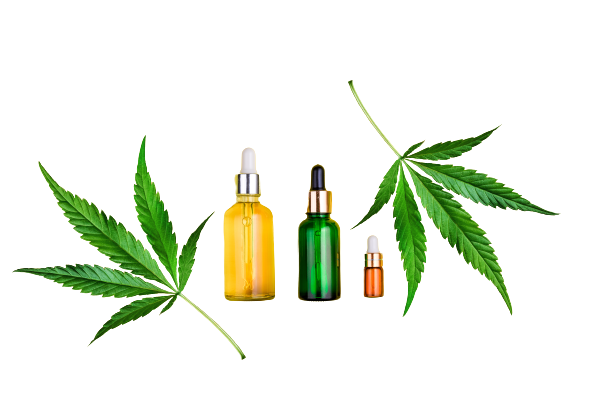
Bottom Line: Can You Use CBD to Quit Tobacco?
Several studies support the use of CBD for quitting smoking. There’s a lot of evidence that suggests CBD may help curb addiction by reducing withdrawal symptoms, increasing relaxation, and reducing cravings for nicotine and other addictive substances.
If you plan on using CBD to help you quit smoking tobacco, be sure to find the product that works best for you. When it comes time to source your CBD, make sure the company you purchase from is reputable, reliable, and produces high-quality cannabidiol.
CBD may not work for every smoker, but it has provided excellent results for many. Could cannabidiol be the tool you need to quit smoking?
References
- Zou, S., & Kumar, U. (2018). Cannabinoid receptors and the endocannabinoid system: signaling and function in the central nervous system. International journal of molecular sciences, 19(3), 833.
- Chye, Y., Christensen, E., Solowij, N., & Yücel, M. (2019). The endocannabinoid system and cannabidiol’s promise for the treatment of substance use disorder. Frontiers in psychiatry, 10, 63.
- Hindocha, C., Freeman, T. P., Grabski, M., Stroud, J. B., Crudgington, H., Davies, A. C., … & Curran, H. V. (2018). Cannabidiol reverses attentional bias to cigarette cues in a human experimental model of tobacco withdrawal. Addiction, 113(9), 1696-1705.
- Hurd, Y. L., Spriggs, S., Alishayev, J., Winkel, G., Gurgov, K., Kudrich, C., … & Salsitz, E. (2019). Cannabidiol for the reduction of cue-induced craving and anxiety in drug-abstinent individuals with heroin use disorder: a double-blind, randomized placebo-controlled trial. American Journal of Psychiatry, 176(11), 911-922.
- Shannon, S., Lewis, N., Lee, H., & Hughes, S. (2019). Cannabidiol in anxiety and sleep: a large case series. The Permanente Journal, 23.
- Morgan, C. J., Das, R. K., Joye, A., Curran, H. V., & Kamboj, S. K. (2013). Cannabidiol reduces cigarette consumption in tobacco smokers: preliminary findings. Addictive behaviors, 38(9), 2433-2436.
